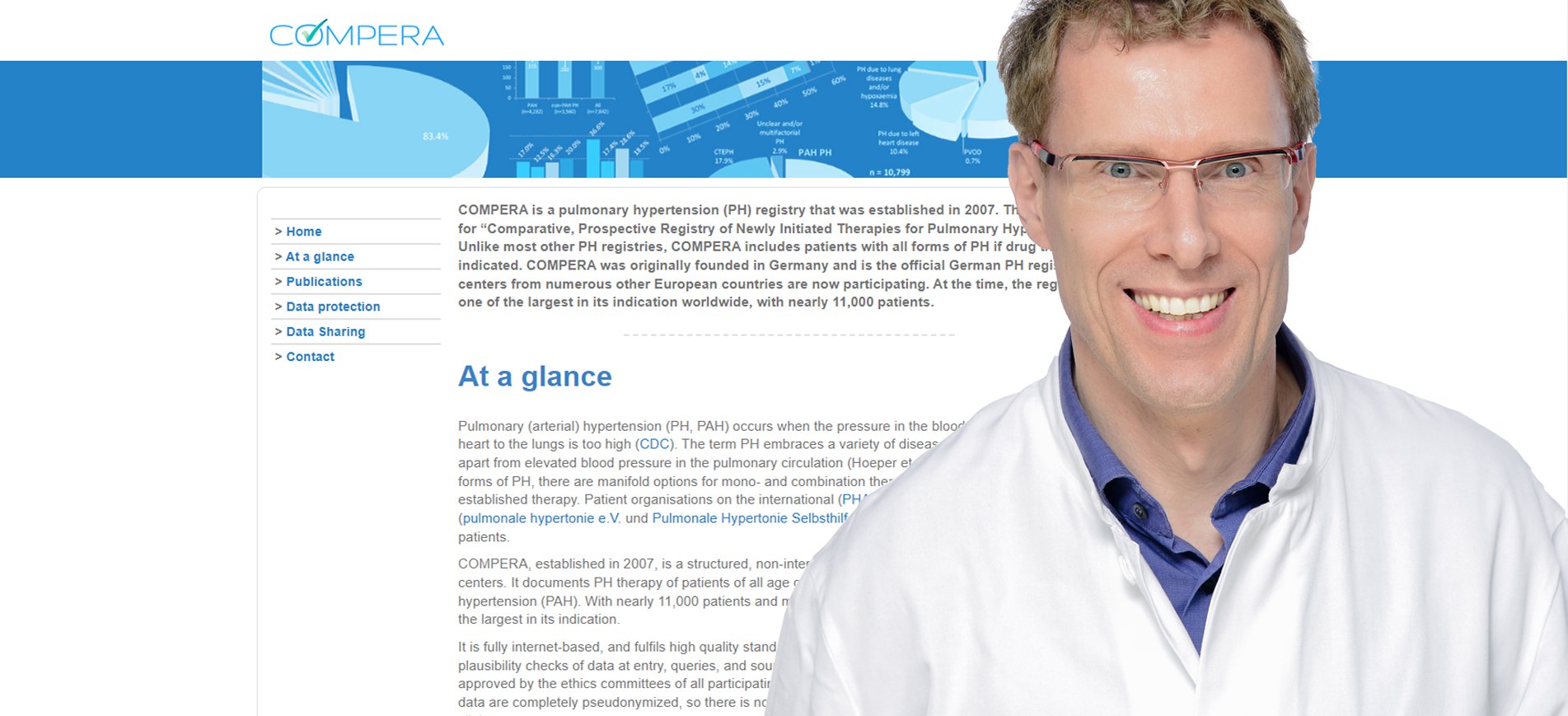Analysis of registry data leads MHH researchers to new insights into certain forms of the disease
![[Translate to Englisch:] One hand holds a lit cigarette](/fileadmin/user_upload/cigarette-2410715_1920.jpg)
"The results of the study support the hypothesis that smoking can cause direct and severe damage to the pulmonary vessels."

Professor Dr. Marius Hoeper in front of the COMPERA Pulmonary Hypertension Registry homepage. Copyright: Tom Figiel / MHH.
29.06.2022
About one percent of the world's adult population suffers from pulmonary hypertension (PH). There are many forms of this disease. One of them is idiopathic pulmonary arterial hypertension (IPAH). This is a rare but very severe form of pulmonary hypertension. The term "idiopathic" means that there is no tangible cause for the disease. A study group led by the Department of Pneumology at the Hannover Medical School (MHH) has now taken a decisive step forward in this regard: The team found out that smoking probably plays a causal role in the development of a particularly severe form of IPAH. The researchers came to this conclusion by analysing data from two pulmonary hypertension registries. The scientific work was published in the journal The Lancet Respiratory Medicine.
Increased shortness of breath with physical exertion
In pulmonary hypertension, the blood pressure in the lung vessels is abnormally elevated. People who suffer from chronic heart or lung disease are particularly often affected. A typical symptom of all forms of pulmonary hypertension is increasing shortness of breath during physical exertion. For their study, the researchers used data from the COMPERA pulmonary hypertension register, one of the largest registers of its kind worldwide, and from the British pulmonary hypertension register ASPIRE. The study leader is Professor Dr Marius Hoeper, Vice Director of the Department of Pneumology.
Researchers compared three different patient groups
In the study, the team compared three different patient groups. The first group consisted of patients with IPAH who had smoked heavily throughout their lives and in whom the so-called diffusion capacity, a decisive factor for the uptake of oxygen from the alveoli into the pulmonary vessels, was highly restricted. The second group consisted of people with a classic form of IPAH without a severely impaired diffusion capacity. The third group consisted of people who had developed pulmonary hypertension as part of a lung disease such as COPD, emphysema or pulmonary fibrosis.
Results help to differentiate patients
"We found that the group of smokers with extremely limited diffusion capacity resembled the group with pulmonary hypertension in the context of lung disease in almost all important ways," Professor Hoeper explains. "This included age and gender distribution, poor response to drug therapies and life expectancy." On the other hand, these patients differed significantly from the classical IPAH group, which was predominantly younger, responded better to drug therapies and had a significantly longer life expectancy. The study team concluded that patients with a diagnosis of IPAH and a history of smoking, as well as severely impaired diffusion capacity, should be differentiated from the group with classic IPAH.
More targeted therapies possible in the future
"The results of the study support the hypothesis that smoking can cause direct and severe damage to the pulmonary vessels," explains Professor Hoeper. Moreover, the findings show that this type of damage also occurs in patients who do not have typical "smoker's lungs". On the one hand, the data are relevant because they prove a preventable cause of pulmonary hypertension. On the other hand, they are important because they help physicians to better understand and classify the disease. "The findings will have a major impact on the conduct of future studies, and they will help us to provide better advice and more targeted therapy to sufferers in the future," says Professor Hoeper.
SERVICE:
For further information, please contact Professor Dr Marius Hoeper, hoeper.marius@mh-hannover.de , telephone (0511) 532-3537.
The original paper "Phenotyping of idiopathic pulmonary arterial hypertension: a registry analysis" can be found here: https://www.thelancet.com/journals/lanres/article/PIIS2213-2600(22)00097-2/fulltext .